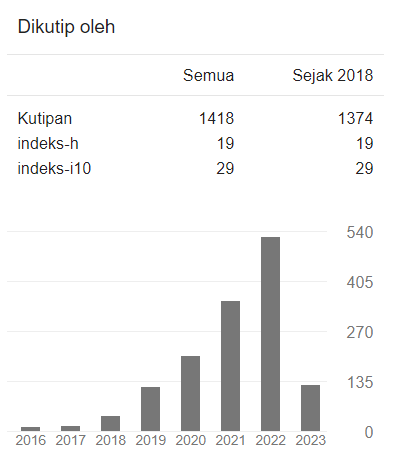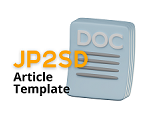Pengembangan Modul Ajar IPAS Kelas IV SD dalam Kurikulum Merdeka
DOI:
https://doi.org/10.22219/jp2sd.v12i2.33030Keywords:
Teaching Modules, Merdeka CurriculumAbstract
This study is motivated by the fact that the number of teaching modules in the independent curriculum at the elementary school level is still applied to Grades I and IV, so many teachers are still confused about making teaching modules in the independent curriculum. Many teachers feel lazy when it comes to developing other than lesson plans, so researchers had the opportunity to develop teaching modules for class IV at the elementary school level as a guide and also a reference for teachers at SD Muhammadiyah 8 Surabaya. The study aimed to determine the validity, practicality, and effectiveness of fourth-grade teaching modules at the Merdeka Curriculum Elementary School. The research is used as a reference for teachers in making teaching modules in the independent curriculum, which, at this time, at Muhammadiyah 8 Surabaya Elementary School, is still transitioning from the 2013 curriculum to the independent curriculum. The method used in this study is the Borg and Gall model development research method. Data collection techniques are validation sheets, questionnaire sheets, and test sheets. The data analysis technique uses percentage, learning completeness, and average value and is categorized according to several valid, feasible, and practical criteria. The results of this development research explained that the teaching modules for class IV of Elementary School were said to be valid in the first validation and were said to be very valid in the second validation after product revisions were carried out, teaching modules for class IV Elementary School were also said to be very suitable for use in class IV Elementary School Muhammadiyah 8 Surabaya and were said to be very effective for students there.
Downloads
References
Afiani, K. D. A., & Faradita, M. N. (2021). Pengembangan Media “MEB” dalam Menumbuhkan Rasa Nasionalis pada Pembelajaran Matematika SD. Jurnal Bidang Pendidikan Dasar, 5(1), 31–41.
Alanur, S. N., Nawing, K., Septiwiharti, D., Syuaib, D., & Jamaludin, J. (2022). Pengembangan Bahan Ajar PPKn Bermuatan Nilai Profil Pelajar Pancasila sebagai Penguatan Karakter Kewarganegaraan Siswa. Jurnal Pendidikan Kewarganegaraan, 12(2), 107–115.
Alimuddin, J. (2023). Implementasi Kurikulum Merdeka di Sekolah Dasar. Jurnal Ilmiah KONTEKSTUAL, 4(02), 67–75.
Ardianti, Y., & Amalia, N. (2022). Kurikulum Merdeka: Pemaknaan Merdeka dalam Perencanaan Pembelajaran di Sekolah Dasar. Jurnal Penelitian Dan Pengembangan Pendidikan, 6(3).
Assyauqi, M. I. (2020). Model Pengembangan Borg and Gall. Researchgate, No. December.
Barlian, U. C., & Solekah, S. (2022). Implementasi kurikulum merdeka dalam meningkatkan mutu pendidikan. JOEL: Journal of Educational and Language Research, 1(12), 2105–2118.
Direktorat sekolah dasar. (2022). Kurikulum Merdeka. Retrieved from https://ditpsd.kemdikbud.go.id/hal/kurikulum-merdeka
Erviana, V. Y. (2018). Pengembangan Modul Ips Pada Materi Gejala Alam Di Indonesia Dengan Pendekatan Scientific Bagi Mahasiswa Pgsd. Profesi Pendidikan Dasar, 5(1), 57–69.
Faradita, M. N., Afiani, K. D. A., & Firmannandya, A. (2023). TEACHER’S CREATIVITY IN MAKING VIDEO-BASED LEARNING IN POST-PANDEMI COVID-19. Jurnal Bidang Pendidikan Dasar, 7(1), 1–11.
Gall, M. D., Borg, W. R., & Gall, J. P. (1996). Educational research: An introduction. Longman Publishing.
García-Rubio, C., Herrero, M., Luna-Jarillo, T., Albert, J., & Rodríguez-Carvajal, R. (2023). Effectiveness and mechanisms of change of a mindfulness-based intervention on elementary school children: A cluster-randomized control trial. Journal of School Psychology, 99, 101211.
Gurubelajar. Id. (2022). Kurikulum Merdeka dan Model Pembelajaran yang Tepat. Retrieved from gurubelajar,id website: https://gurubelajar.id/kurikulum-merdeka-dan-model-pembelajaran-yang-tepat/
Kiong, T. T., Yunos, J. M., Mohammad, B., Othman, W., Heong, Y. M., & Mohamad, M. M. (2012). The development and implementation of the Buzan mind mapping module. Procedia-Social and Behavioral Sciences, 69, 705–708.
Maulida, U. (2022). Pengembangan modul ajar berbasis kurikulum merdeka. Tarbawi: Jurnal Pemikiran Dan Pendidikan Islam, 5(2), 130–138.
Muhroji, M., & Yusrina, H. (2018). Penggunaan Modul pada Pembelajaran Tematik di SDN 1 Jimbung Klaten. Profesi Pendidikan Dasar, 5(1), 1–9.
Nuraini, Dwi; Anggraini, Lanny; Misiyanto, Mulia, K. R. (2022). Serba-Serbi Kurikulum Merdeka. 1–51.
Nurhayati, P., Emilzoli, M., & Fu’adiah, D. (2022). Peningkatan Keterampilan Penyusunan Modul Ajar Dan Modul Proyek Penguatan Profil Pelajar Pancasila Kurikulum Merdeka Pada Guru Madrasah Ibtidaiyah. JMM (Jurnal Masyarakat Mandiri), 6(5).
Syahria, N. (2022). Pengembangan modul ajar kurikulum merdeka mata pelajaran bahasa Inggris SMK kota Surabaya. Gramaswara, 2(2), 49–62.
Thalib, A., Winarti, P., & Sani, N. K. (2020). Pengembangan modul praktikum serli (discovery learning) untuk pembelajaran sains di sekolah dasar. Profesi Pendidikan Dasar, 7(1), 53–64.
Wuryanto, H. dkk. (2022). Mengkaji Kembali Hasil PISA sebagai Pendekatan Inovasi Pembelajaran untuk Peningkatan Kompetensi Literasi dan Numerasi. Retrieved from https://gurudikdas.kemdikbud.go.id/news/mengkaji-kembali-hasil-pisa-sebagai-pendekatan-inovasi-pembelajaran--untuk-peningkatan-kompetensi-li
Zhang, F., Zhao, H., Li, Y., Wu, Y., & Sun, X. (2023). CBA-GAN: Cartoonization style transformation based on the convolutional attention module. Computers and Electrical Engineering, 106, 108575.
Downloads
Published
Issue
Section
License
Copyright (c) 2024 Meirza Nanda Faradita, Kunti Dian Ayu Afiani

This work is licensed under a Creative Commons Attribution-ShareAlike 4.0 International License.
Authors who publish with Jurnal Pemikiran dan Pengembangan Sekolah Dasar (JP2SD) agree to the following terms:
- For all articles published in Jurnal Pemikiran dan Pengembangan Sekolah Dasar (JP2SD), copyright is retained by the authors. Authors give permission to the publisher to announce the work with conditions. When the manuscript is accepted for publication, the authors agree to automatic transfer of the publishing right to the publisher.
- Authors retain copyright and grant the journal right of first publication with the work simultaneously licensed under a Creative Commons Attribution-ShareAlike 4.0 International License that allows others to share the work with an acknowledgment of the work's authorship and initial publication in this journal.
- Authors are able to enter into separate, additional contractual arrangements for the non-exclusive distribution of the journal's published version of the work (e.g., post it to an institutional repository or publish it in a book), with an acknowledgment of its initial publication in this journal.
- Authors are permitted and encouraged to post their work online (e.g., in institutional repositories or on their website) prior to and during the submission process, as it can lead to productive exchanges, as well as earlier and greater citation of published work (See The Effect of Open Access).

This work is licensed under a Creative Commons Attribution-ShareAlike 4.0 International License.


















